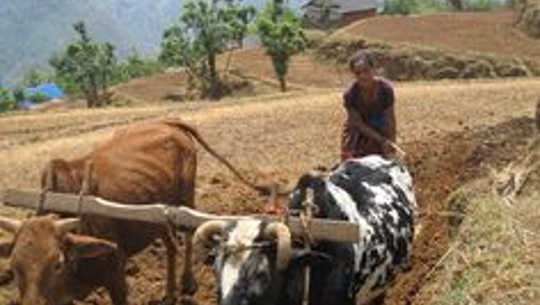
Concerns about environmental damage caused by costly chemicals and worries about climate change are altering farming methods in the mountains of Nepal.
For centuries, Nepalese farmers have been mixing the dung and urine of their buffaloes, cows and goats with vegetable compost to make solid manure.
But scientists and agricultural development experts have now helped eight “climate-smart” villages in the foothills of the Himalayas to make liquid variants of this traditional organic fertilizer.
Special mixes of dung, urine, water and additives – including leaves from trees in local woods – have been developed over the past two years to help fix nitrogen and other important plant nutrients into the soil. The bio-fertilizers are collectively known as “jholmol”.
Get The Latest By Email
Such organic methods are not only good for the soil, they also contribute to the natural carbon cycle, ensuring carbon is sequestered in the earth.
Beneficial microbes
Some mixes of jholmol – such as those containing leaves from the neem tree and stinging nettles, and a special package of beneficial microbes, called jeevatu − also serve as pesticides to control insects and fungal infections.
Yam Presad, who farms just under half a hectare of land in Naubise, a poor village on the floor of a steep-sided valley two hours’ drive east of Kathmandu, has been using jholmol for the past year.
“Jholmol does not increase the amount of rice and vegetables I grow, but it saves me having to buy chemical fertilizers, and people like the produce better,” he says.
“The cabbages are not shiny, like they were when we used chemical fertilizers and pesticides, but they taste a lot better. People like the fact that we only use natural products. They regard it as safe food.”
The Centre for Environmental Policy, Research and Development (CEAPRED), a Nepal-based NGO, is helping to establish eight “climate-smart” villages in the centre of the country.
Increasingly erratic rainfall is making it more difficult to eke out a living from agriculture. The annual monsoon rains tend to arrive later than in the past, and when the rain does fall it often buckets down in heavy downpours that are interspersed with long dry periods.
Meanwhile, scientists say temperatures across much of the Himalayan region are increasing at twice the global average.
Along with the Kathmandu-based International Centre for Integrated Mountain Development (ICIMOD), CEAPRED is encouraging villagers to experiment with new ways of conserving water and new crop-growing techniques that will still give a good harvest, despite the changes in climate.
In Naubise, as everywhere in the deceptively green mountains of Nepal, water is in short supply for both drinking and irrigation.
It is easy for farmers to make jholmol because virtually every Nepalese smallholding has a couple of cows and one or two buffaloes to provide milk and pull the plough.
The manure is often also used for energy – shovelled into tanks to make bio-gas, which powers a gas ring in the kitchen.This saves on wood fuel and helps to preserve the precious community-owned forests that still cover the steepest hillsides.
Population pressure has gradually reduced the size of farms in Nepal over the past 50 years. The average size of a family holding today is just 0.8 hectares – and much less in many hilly areas.
Cash remittances
Most smallholdings are unable to provide adequate food or cash income for a family, so, increasingly, rural families depend on cash remittances from one or more sons who have gone abroad to find work.
Some estimates put the number of migrant workers driven off the land by poverty at more than three million – about 10% of Nepal’s 32 million population.
This year, the farmers of Naubise and hundreds of other mountain villages in central Nepal are even more hard-pressed than usual due to the series of earthquakes in April and May that killed more than 8,500 people and destroyed buildings in many communities.
Small self-help improvements such as jholmol are likely to play a key role in assisting the rural poor of Nepal – and potentially other mountainous countries in Asia – to survive in an increasingly harsh environment and deal with the impacts of climate change. – Climate News Network
Main reporting by Robert Powell, a journalist and humanitarian communications specialist.
Email: This email address is being protected from spambots. You need JavaScript enabled to view it.; LinkedIn: https://uk.linkedin.com/pub/robert-powell/6/580/4b3
About the Author

Kieran Cooke is co-editor of the Climate News Network. He is a former BBC and Financial Times correspondent in Ireland and Southeast Asia., http://www.climatenewsnetwork.net/







